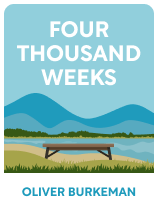

This article is an excerpt from the Shortform book guide to "Four Thousand Weeks" by Oliver Burkeman. Shortform has the world's best summaries and analyses of books you should be reading.
Like this article? Sign up for a free trial here .
Do you always feel like there’s not enough time in the day? How can you make the most of the time you do have?
You’ll never have enough time to do everything you want. Relatedly, you’ll never be able to meet your and society’s expectation of “getting everything done,” and you’ll never have total control over how you spend your time. When you accept this, you free yourself from the burden of trying to meet unrealistic expectations, and you’ll become happier.
Here are six tactics Burkeman proposes for making the most of your time.
#1: Make Time for Critical Tasks Now
Prioritize tasks that matter most by making time for them before you do anything else, advises Burkeman. Don’t wait until time opens up. New tasks will always pop up to occupy freed-up time). Instead, just do them now, accepting that, due to opportunity costs, you likely won’t get to other tasks that matter to you.
(Shortform note: The idea that you must make time for important tasks is the foundation of Robin Sharma’s book The 5 AM Club. In it, he advocates for making time for key tasks by waking up at 5 a.m. and taking an hour to engage in important activities: exercise, personal reflection, and personal growth. Unlike Burkeman, though, Sharma doesn’t believe there must be an opportunity cost to making time for these important tasks, because you wouldn’t be doing anything else between 5 and 6 a.m. (other than sleeping).)
#2: Limit Your In-Progress Projects
If you often feel like there’s not enough time in the day to complete everything on your agenda, don’t take on more commitments than you can handle just to feel that you’re being productive. Limit yourself to three projects, and only take on new ones once old ones are done. Because you only have a few items to do, this will relieve you of a feeling of overwhelm.
(Shortform note: Burkeman recommends taking on only three projects at a time, but this can mean saying no to people who want you to do something for or with them, which can be difficult and awkward. According to Greg McKeown, you can strengthen your ability to say ‘no’ by thinking about the opportunity costs of saying ‘yes.’ If you remind yourself that accepting an invitation to drinks would mean not spending time with your kids, it becomes easier to decline, for instance.)
#3: Resist Distraction by Being Okay With Discomfort
To work within your time constraints, avoid distracting yourself from high-priority tasks that force you to confront your limitations (as discussed in Part 2) by developing a tolerance for discomfort, suggests Burkeman. This makes the task less unpleasant and allows you to see it through to completion. For instance, when editing a movie you made (which is important to you), you feel you fell short of achieving your vision. This could cause you to distract yourself from editing by watching TV so you don’t have to confront the limitations of your talent and skill. Instead, if you acclimate to the discomfort of editing your sub-par movie, you can see the task through to the end.
(Shortform note: A tolerance for discomfort isn’t just necessary to complete important and challenging tasks: It’s also critical to personal growth. In The 12 Week Year, Brian Moran argues that improving yourself and swapping bad behaviors for good ones is uncomfortable because you’re stretching yourself in new ways. Most people dislike this discomfort so much that they abandon their self-improvement efforts. However, Moran believes that if you can tolerate the discomfort, you can grow into the person you want to be.)
To develop a tolerance for discomfort, Burkeman proposes that when you notice yourself being distracted from an important task, immerse yourself more in it by paying closer attention to it. For example, if you become distracted from the important task of learning how to play the violin, pay even more attention to the details of your practice: Notice how some of the notes sound bad and others good, how your hands feel, and how the bow glides across the strings.
(Shortform note: In Indistractable, Nir Eyal provides a more elaborate, four-step framework for how to resist distraction: First, identify the trigger that makes you want to distract yourself. Next, write down what the trigger is. Third, pay attention to the feeling of discomfort that accompanies the need to distract yourself (as Burkeman recommends). Finally, resist the cravings for distraction by telling yourself you’ll give in and distract yourself in 10 minutes. Usually, the urge to distract yourself passes in that time.)
#4: Stop Expecting the Future to Unfold Exactly as Planned
Having accepted that you’ll never master your time, work within that restraint by being open to the future veering from the plans you’ve created, advises Burkeman. The future is unknowable, and you have little real control over it. When you develop expectations of what should happen in the future and those expectations aren’t met, you both waste time planning and also become unhappy.
For example, you might build an in-home panic room to assure your future safety. However, a new job might force you to move into a new home, rendering your attempt to control the future futile and leaving you unhappy over your wasted efforts.
(Shortform note: Burkeman advises you to stop planning the future as though you can predict exactly how it will unfold. However, for people who suffer from anxiety, trying to control the future can be more of a compulsion than a conscious choice. Anxiety-prone people strongly need to feel in control of their lives, so they plan meticulously to ensure they know what will happen in the future. Beyond the wasted time and unhappiness such behavior generates, highly controlling and anxious people also often cause conflict because they want others to fall in step with their plans.)
Burkeman adds that you can help yourself become okay with the idea of not having control over the future by considering how little control you’ve had over your life until now. Most of your life has been a series of events over which you had no say: the event of being born, your upbringing in a certain area, your chance meeting with your partner-to-be, and so on. If you’ve succeeded thus far in life merely by happenstance—not through your iron control—then it will probably be okay in the future when things occur by happenstance, too.
(Shortform note: Burkeman suggests that you can develop comfort with the idea of not having control over the future by reflecting on how little control you’ve had over your life thus far. You might also develop comfort with your lack of control over the future by becoming aware of how much you’ll change in the future—a process that’s also arguably outside of your control. According to David Epstein, author of Range, humans’ needs, wants, and even personalities change over the course of their lives. Reminding yourself that you don’t know for sure what you’ll want in the future may help you worry less about achieving future goals. )
#5: Develop Patience for the Current Pace of Life
Rather than expecting the pace of everything in your life to accelerate (as discussed in Part 2), cultivate patience for how long activities take now, advises Burkeman.
(Shortform note: Burkeman writes that you should cultivate patience for how long things currently take as part of accepting your limitations, but he doesn’t propose ways to become more patient. You can cultivate patience by simply paying greater attention to the world around you. When you force yourself to notice things, you also force your mind to slow down.)
According to Burkeman, you can strengthen your patience muscle by breaking a large task into short periods of work and forbidding yourself from doing any additional work after that period has elapsed. Every time you force yourself to stop working before you want to, you confront the feeling of impatience and become a little more comfortable with it. Over time, you’ll get much more accomplished than those who rush through all their tasks and burn themselves out.
(Shortform note: To help yourself break a large task into shorter, repeated periods of work, consider transforming the task into a tiny habit, as described by BJ Fogg in Tiny Habits. Tiny habits don’t demand much time, are actions you can perform right away, and are low-risk. If you make a tiny habit out of the big task, you’ll be able to easily return to it over short periods of time, thereby building your patience as you slowly work toward the long-term goal.)
#6: Align Your Free Time With That of Your Friends
Finally, having accepted that you’ll never wield total control over your time, align your schedule with that of the people you want to spend time with, counsels Burkeman. Even though structuring your free time around other people’s schedules initially seems restrictive, you’ll be much happier and feel less isolated.
(Shortform note: Burkeman proposes that you align your schedule with those of the people you want to spend time with. But not only does spending time with others free you from the burden of needing to control your time fully, it also has positive physiological effects, like lowering the level of cortisol, a stress hormone, in your body. Relinquishing control and reducing stress can together greatly increase your happiness.)
Burkeman suggests you sacrifice control for community by joining after-work activities that force you to be with people at a set time. You might join an amateur theater troupe or running group that meets regularly, for example.
(Shortform note: Joining after-work group activities, as Burkeman suggests, can be more difficult for introverts, who need alone time to recharge. To participate in group activities with minimal stress, introverts can balance stimulating activities with less stimulating ones. An introvert might spend an hour at home relaxing before going to a running group, for example.)

———End of Preview———
Like what you just read? Read the rest of the world's best book summary and analysis of Oliver Burkeman's "Four Thousand Weeks" at Shortform .
Here's what you'll find in our full Four Thousand Weeks summary :
- Why humans will never have perfect control over how they spend their time
- Why you shouldn't feel guilty when you can't get everything done
- How to best use the finite amount of time you have on Earth






